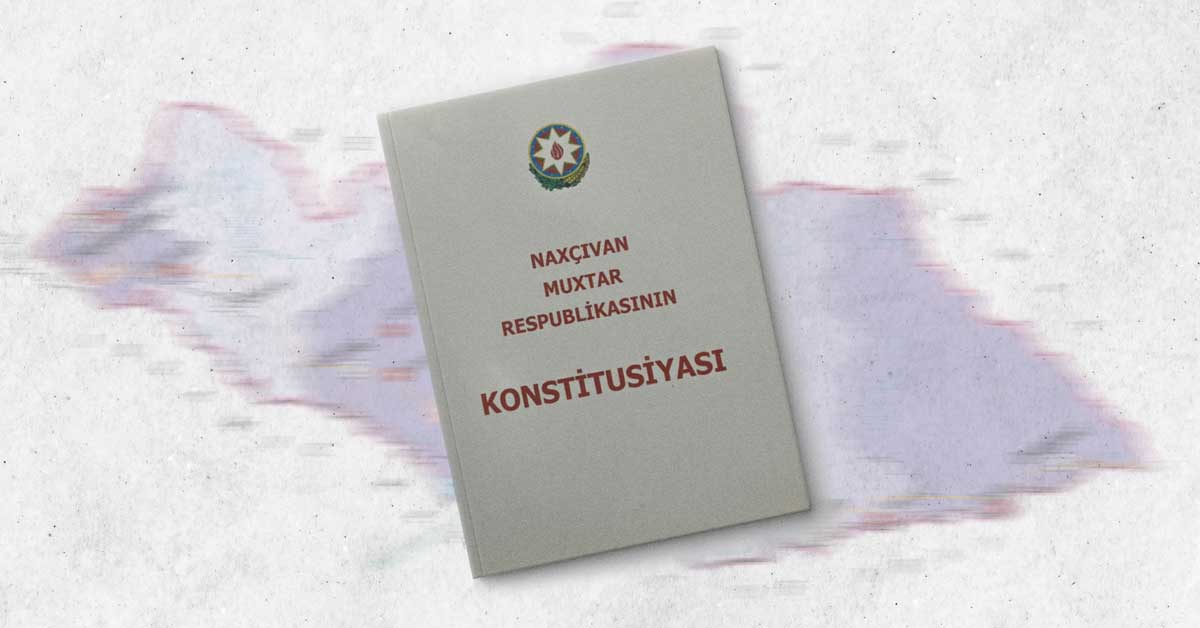“GEGHARD”
SCIENTIFIC ANALYTICAL
FOUNDATION
2026
2026
2025-09-24

On July 8, 2025, the National Assembly of Azerbaijan adopted at the third reading the constitutional law of Azerbaijan “On Amendments to the Constitution of the Nakhijevan Autonomous Republic.” This ostensibly legal process, which followed a series of significant structural and personnel changes in the Nakhijevan Autonomous Republic (NAR) since 2022, is noteworthy not only from the perspective of Azerbaijan’s domestic political developments and administrative changes, but also from geopolitical and regional standpoints.
Structural and personnel changes: In 2020, following the war against Artsakh, Ilham Aliyev carried out a series of changes not only in Azerbaijan but also in Nakhijevan. In particular, in November 2022, the State Security Service and the State Customs Service of the NAR received branch status and subordinated to the central bodies in Baku. At the same time, several incumbent and former ministers and officials of Nakhijevan were arrested.
In December 2022, Aliyev pressured Vasif Talibov, the chairman of the NAR Mejlis, to resign. Instead, Aliyev established the position of the plenipotentiary representative of the Azerbaijani president in Nakhijevan, endowed with broad powers of oversight over the Autonomous Republic’s state institutions. By doing so, the president of Azerbaijan effectively transferred the entire authority of the autonomy to his “plenipotentiary representative,” thereby subordinating the NAR’s state institutions directly to Baku.
Ilham Aliyev had outlined plans for personnel and structural reforms as early as 2019. Talibov’s reaction concerning new appointments in Nakhijevan was sharp. To discuss the contentious issues, Aliyev twice invited Talibov to Baku, but the latter refused the invitations, which exacerbated tensions. To break Talibov’s resistance, Baku “set in motion” state media outlets. Deputies and other officials who expressed their “dissatisfaction” with Nakhijevan’s leadership called on Baku to establish a more centralized system in the region. As a result of the arrests of Talibov’s relatives and the reduction of subsidies to Nakhijevan (which made up the majority of the NAR’s budget), in December 2022 Talibov traveled to Baku for a meeting with Ilham Aliyev. However, Aliyev refused to receive him, after which Talibov—who had ruled in Nakhijevan since 1995—submitted his resignation.
In effect, Ilham Aliyev had finally managed to “get rid of” a prominent advocate of Nakhijevan’s autonomy and former ally of Heydar Aliyev.
In the context of the removal of a key figure in the NAR, along with the preceding and subsequent changes, Aliyev’s behavior can be characterized as a consistent policy of depriving Nakhijevan of its autonomy. Yet, what deserves attention here are the circumstances of who among the external actors “permitted” Ilham Aliyev to initiate the process of altering Nakhijevan’s legal status, and what exactly they “permitted” him to do.
Constitutional amendments: According to the law adopted by Azerbaijan’s Milli Mejlis, the following changes were made to the Constitution of the Nakhijevan Autonomous Republic (NAR):
The removal of references to the Moscow and Kars treaties from the Constitution’s preamble and the declaration of Nakhijevan as an inseparable part of Azerbaijan indicate that Aliyev is indeed dissolving the political and legal link of the autonomy with Turkey and Russia. This, in turn, will allow Aliyev to avoid external interference in matters concerning Nakhijevan, while the personnel and structural changes, along with the introduction of a vertical system of governance, will also help neutralize potential resistance from local clan-based groups.
Thus, we may conclude that Aliyev likely received a “green light”—primarily from the West, led by the United States—to implement such major legal changes aimed at removing Nakhijevan from the sphere of Russian-Turkish relations and curbing Iran’s influence in the region. In this context, the lack of objections from other key stakeholders (China, India, and the United Kingdom) can also be seen as tacit approval, since the stable status of Nakhijevan is equally important for them—as long as control over the “North–South” transport corridor, China’s “Belt and Road Initiative,” or the “Middle Corridor” passing through Nakhijevan remains beyond the direct reach of Turkey, Russian, and Iran. This interpretation is further supported by statements from Azerbaijani deputies and senior officials, who explicitly link the constitutional amendments in Nakhijevan to transportation issues.